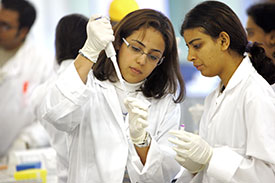Science Opportunities
 Science and engineering students often have fewer opportunities to study abroad; strict
sequencing of classes often is a roadblock. The flexibility and support offered by
the Loyola University Maryland Center at Newcastle University allows students to take
classes that work for them. Rather than being locked into a sequence, they can choose
what will be most beneficial to the progress of their degree. Newcastle has a history
of hosting science students, and, in fact, was originally founded as a School of Medicine.
Newcastle University is ranked in the top 12 for research in the U.K. and is home
to some world-class research institutes and facilities including: the Institute of
Ageing and Health, Northern Institute for Cancer Research (NICR), North-East England
Stem Cell Institute (NESCI), University Science City, and Marine Engineering Towing
Tank.
Science and engineering students often have fewer opportunities to study abroad; strict
sequencing of classes often is a roadblock. The flexibility and support offered by
the Loyola University Maryland Center at Newcastle University allows students to take
classes that work for them. Rather than being locked into a sequence, they can choose
what will be most beneficial to the progress of their degree. Newcastle has a history
of hosting science students, and, in fact, was originally founded as a School of Medicine.
Newcastle University is ranked in the top 12 for research in the U.K. and is home
to some world-class research institutes and facilities including: the Institute of
Ageing and Health, Northern Institute for Cancer Research (NICR), North-East England
Stem Cell Institute (NESCI), University Science City, and Marine Engineering Towing
Tank.
Studying Biomedical Sciences?
In the U.K., students can do a Bachelor's in Medicine as an undergraduate, and, as such, the School of Biomedical Sciences is equipped for U.S. study abroad students who are pursuing a career in medicine. This gives students a competitive edge as they are able to jump into coursework that might otherwise be unavailable to them.
Newcastle Science City
Newcastle was designated as one of six U.K. Science Cities in recognition of the world-class research being undertaken by its universities, and the potential of its science industry base. Science City is a collaboration bringing people, businesses, and educational institutions across the Newcastle region, together in science and innovation. It focuses on three scientific fields: aging and health at Newcastle University’s Institute for Ageing and Health; stem cell and regenerative medicine at the International Centre for Life; and sustainability, which will be the focus of the Science Central site.
